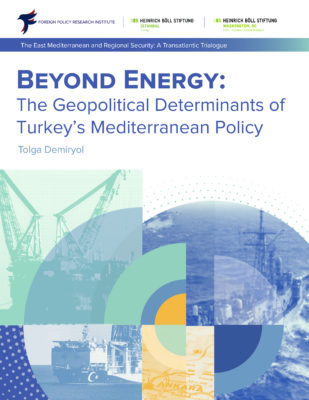
The Eastern Mediterranean has recently emerged as one of the hottest conflict zones in the world. It has everything one would need for a nail-biting thriller: energy reserves, international companies, reckless leaders, and battleships trying to outmaneuver each other in close quarters. In many ways, the Mediterranean case looks like yet another maritime conflict, where actors with opposing legal claims compete over the distribution of resources. Historically, such maritime disputes are often resolved through negotiation, compromise, and sometimes referral to international courts. However, the distinctive feature of the Mediterranean case is the complexity and intensity of the geopolitical rivalries that accompany the energy disputes, which in turn has led to conflict escalation and entrenchment.
While the Mediterranean drama has a large cast, Turkey has surely one of the leading roles. Ankara regularly conducts seismic research operations in the disputed territorial waters of the Mediterranean. Turkish research vessels are often accompanied by naval escorts, which in several instances has resulted in close calls at sea. Turkey is also seeking a stronger naval presence, supported by an ambitious initiative of shipbuilding and modernization. Rejecting accusations of gunboat diplomacy, Ankara says it is committed to dialogue. Ankara’s unique blend of drilling, diplomacy, and deterrence, however, has drawn criticism from rivals and allies alike. The EU has repeatedly warned Ankara to respect the sovereignty of the Republic of Cyprus (RoC) and Greece. The US, while not keen on reasserting itself into the region, has also been quietly critical of Turkey’s actions.
What is driving Turkey’s increasingly assertive Mediterranean policy? Ankara is undoubtedly keen on getting its share of the region’s energy riches. Despite its recent gains in the diversification of natural gas imports, Turkey still suffers from energy import dependence. Even at limited volumes, Mediterranean gas reserves would be a welcome addition to Turkey’s import portfolio, if only to increase Ankara’s leverage against existing suppliers like Russia. Ankara has also long pursued the position of a regional energy hub, which will require the ability to attract gas imports from multiple regions.
Yet it is not energy security, but rather geopolitical considerations that principally drive Ankara’s Mediterranean strategy. While competition over energy reserves and transit routes plays a key role, its impact is mediated through the geopolitical dynamics of the region. The chief proposition here is that rather than an upfront “energy grab,” Turkey’s policy is best understood as a response to perceived threats to its maritime sovereignty, as well as a product of an increasingly pervasive perception of regional isolation and encirclement.
This paper’s analysis proceeds in two sections. The first section discusses two interrelated issues that have shaped Ankara’s decidedly securitized Mediterranean outlook: maritime delimitation disputes and the divided status of Cyprus. The second section focuses on recent shifts in regional alignments, most notably the emergence of a regional bloc consisting of Israel, the RoC, Greece, and Egypt. It is this latter development that has paved the way for the perception that Turkey is being excluded from the emergent regional order. To evade this geopolitical predicament of encirclement and isolation, Turkey has adopted a posture of “forward defense,” which relies on hard power instruments coupled with an assertive diplomacy to extend control over cross-border areas.
No comments:
Post a Comment